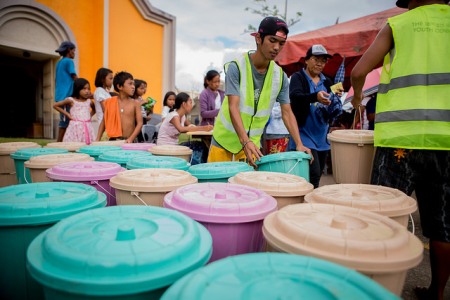With Agenda 2030 agreed just last year, 2016 marks the first year of the Sustainable Development Goals (SDGs). During this first year, CAFOD has been working with southern partners to support implementation plans at national level. With 14 years left to achieve them all, one thing is clear: the process to implement the SDGs is creating new platforms for dialogue between civil society and governments. And the encouraging part is that in many countries, governments are actually listening.
Let’s agree that the SDGs aren’t perfect, but they’re still a great plan for the world. They offer an opportunity to do things differently. As CAFOD’s animations show, we see four transformational shifts with the SDGs: 1) they are universal, so no more “you there”, “we here”; 2) they give us a plan to integrate social, economic and environmental solutions (at last!); 3) they tell us to do all of this while leaving no one behind; and 3) to make sure that we do it in an open, inclusive and participatory way all the way through.
A few lessons so far…
During 2016, CAFOD supported five partners across 3 continents to be part of SDG implementation processes at national level. Our support model follows three simple stages: 1) discuss, learn and understand what the SDGs are; 2) create the tools and structures needed to participate effectively; and 3) build strong and reliable relations with policy makers.

First SDG workshop organised by Caritas Sierra Leone to form Sierra Leone Coalition 2030
In the last months, some partners have been organising workshops for marginalised communities to learn about the SDGs or training sessions for journalists to write about them. Others have created new coalitions, or joined existing ones, to speak with one single voice. A few have done technical research to make sure that they have reliable data to better monitor any real progress and hold governments to account. Other examples include:
In Sierra Leone, our partners have created a coalition of civil society organisations (CSOs). Sierra Leone Coalition 2030 is now the SDG focal point and the formal organisation to talk with the national government. Having a coalition has shown to be extremely effective. It has helped organisations to learn from each other instead of competing between each other; the government has formally included them in the process; and it has allowed smaller organisations (those usually left behind) to have a voice. (see @coalition_2030)
In the DRC, CSOs see Agenda 2030 as the vision for the future of their country, something they say their government doesn’t have – and something to “finally aspire to”. Some of our partners in the Eastern provinces of the DRC have been using the SDGs to strengthen their programmatic work by aligning their strategies with goals and targets. They say the SDGs are helping them link different areas of work that’re usually treated separately. For example, education and health with sustainable agriculture. And their government is listening. (see @CaritasCongo)
In Zimbabwe, our partners have been training journalists to cover the SDGs in a way that helps them frame complex issues for the public. For instance, the link between the current droughts and gender inequality could be explained better through the SDGs. (see @PRFTZim).
In Bolivia and Bangladesh, our partners are focusing on training local community leaders, women’s rights organisations, indigenous groups, trade unions or communities representing people with disabilities, to better frame their demands from a human rights perspective. Others see the SDGs as a useful tool to enforce existing legislation at local level, such as the Disability Act in Bangladesh. (see @redunitas and ADD Bangladesh)

Caritas Delegation at the UN HLPF in New York, July 2016
In addition, CAFOD is also working in collaboration with the Caritas Internationalis confederation to ensure national Caritas organisation influence their governments on national SDG implementation in Kenya, Nigeria and Ghana (see report).
The results are mixed, yet positive. Above all, they show one very clear thing: the process to implement the SDGs is opening new opportunities for good dialogue among and between CSOs and government. Seizing these opportunities and making the best of them is now up to us.
Joint working and collaboration is key. If you or your organisation is working on SDGs in one of these countries, drop me a line: dmartinez@cafod.org.uk
 Graham Gordon, CAFOD’s Head of Policy, introduces a paper which explores the relationship between the Sustainable Development Goals and Pope Francis’s encyclical on the environment and development, Laudato Si’
Graham Gordon, CAFOD’s Head of Policy, introduces a paper which explores the relationship between the Sustainable Development Goals and Pope Francis’s encyclical on the environment and development, Laudato Si’







